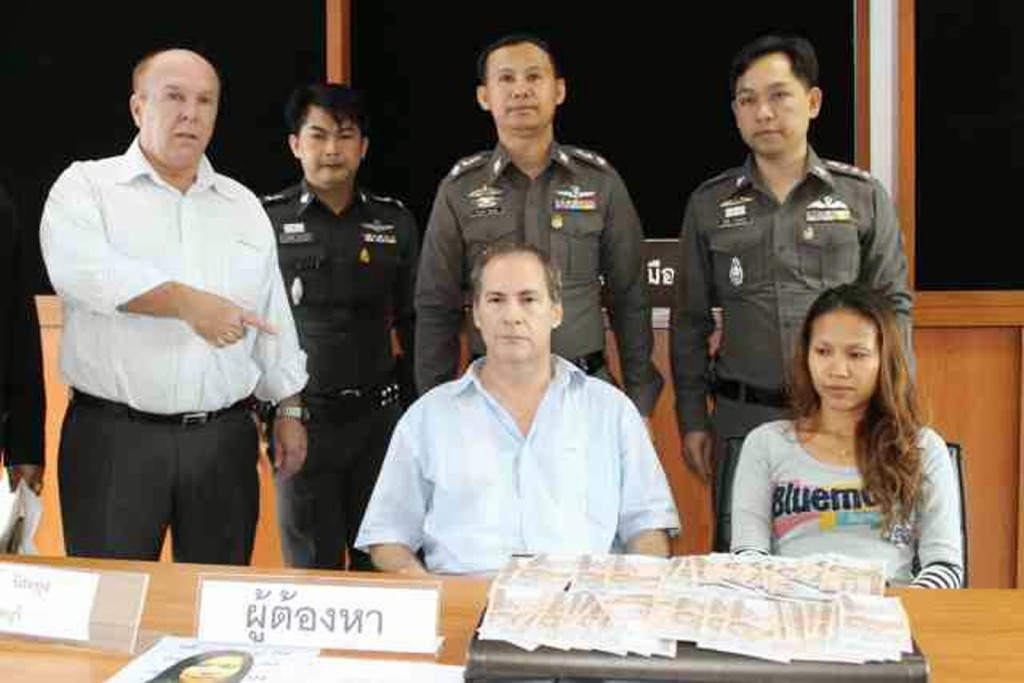Ninety year leases provided to foreigners acquiring properties in Thailand have been ruled null and void by the Thai courts – the Phuket News trumpets.
The matter has still to go to the Supreme Court but the appeal court ruled that this is the case and that could leave thousands of foreigners in Thailand very twitchy, particular down south in Phuket and Koh Samui where foreigners have been acquiring houses in bulk.
According to Phuket News’ legal expert Jerrold Kippen this means that anyone who has one of
these ‘secured’ or ‘collective’ leases have 100 per cent of nothing. The whole lease agreement is void.
They were essentially a plan dreamed up by property developers and realtors to enable them to sell dreams to foreigners.
Of course, with few exceptions it’s illegal for foreigners to own land in Thailand.
But wait, Jerrold Kippen has an answer:
“The good news, he said, is that secured leases can be restructured to provide actual long-term lease security legally and without any downside to the developer by securing the pre-paid renewal terms with a mortgage over the land involved.
“It is a simple and straightforward legal structure that provides security for the investor. A current ‘Secured’ Lease can be restructured into this better and genuinely secure alternative, before it is too late.
“As always,” he added, “you should engage competent legal and tax counsel in order to implement this mortgage-based security structure successfully.”
Oh that’s alright then. That means the purchase is legal and agents were not doing to so ‘in order to hide their actual agreement to sell and buy the properties.’
Well thanks Jerrold. Now who do all those who bought in Phuket go to for help?
I had visions of another American ‘lawyer’ who started up in Pattaya and then announced the Thai government would seize properties owned by foreigners in the name of dormant companies whose shareholders were ‘nominees. But he had the answer.
But unlike the ‘one stop’ and ‘bestpattayalawyer’ guy Jerrold is kosher and does have a law degree. He was called to the bar in 2006.
He has however stated that he has been ten years in Thailand. That means he practiced law for all of minus one year in the US. (He cannot practice it in Thailand).
That minus one year I understand was in Guam as a law clerk in the public prosecutor’s office.
He was brought up in the United States in the era of Harry Potter I guess among other things.
That is not so say he has not built up a wealth of experience in those ten years. He is now an authority on Alternative Dispute Resolution, Business Law, Commercial Law, Construction Law, Contracts Corporate Law, International Law Investments, Labor & Employment Mergers & Acquisitions Real Estate Taxation Zoning, Planning & Land Use.
Phuket News interviewed him – These are some of his answers.
TELL US ABOUT YOUR JOB.
I am a licensed California attorney running a law firm in Thailand. Have you ever seen Batman? It’s like that.
WHAT IS THE BEST THING ABOUT LIVING HERE?
Plenty of villains, so I never get bored.
WHAT DO YOU DO TO RELAX?
Hot yoga and kitesurfing.
FAVOURITE FOOD OR DISH?
Carne asada burrito with guacamole, pizza, gai phat prik pao, Double Double Animal Style burger from In-N-Out, enchilada, Burtoni’s pesto sauce on spinach linguine with black olives and pepper jack cheese, spaghetti with my homemade sauce, tacos, and a lot of other food that is not British.
WHO IS THE PERSON YOU ADMIRE THE MOST AND WHY?
Voldermort because he was the one whose name shall not be mentioned.
WHERE IN PHUKET WOULD YOU TAKE SOMEONE ON A FIRST DATE?
Preferably their place but if not available mine.
And finally, despite what the estate agents or realtors and their lawyers tell you in Thailand, anything over a 30 year lease is extremely dodgy and not worth the paper it is printed on. And indeed so are dormant nominee companies created by foreigners to hold properties. The authorities, of course, have only acted spasmodically on the latter – but if you fall foul of favour so to speak – you can lose everything. In short you are lucky until you are unlucky.
# American dig: Harry Potter and the Philosopher’s Stone was released in the US as ‘Harry Potter and the Sorcerer’s Stone’ as American’s could not deal with the word philosopher. This is of course why the US could be the cause of the end of the world.
 |
| The Weapon’s View |
LEGAL NOTE: Very few foreign lawyers can practice in Thailand. So bear in mind that what your American lawyer says is the same as what the Thai lawyer (who may not speak English) says – and check all translations yourself.
* #DrewNoyes an American who falsely claimed to be a lawyer in Pattaya and to be on the Amcham legal committee has had his visa connected to his business revoked and is now on a ‘going to court’ visa.as a defendant due to his conviction and two year jail sentence for extortion.
He gained fame three years ago when he announced in his now defunct Pattaya Times newspaper that the Thai Government were about to grab properties which had been bought by foreigners in domant company names. He directed readers to his PAPPA Law company (now operating as One Stop Service Center) which, he said could fix the problem. One Scottish pensioner Joseph McCluskey was offered 200,000 baht for his 3 million baht property but Noyes told Joe he could live there for the rest of his life. Joe was 76. He smelled a rat.
Jerrold actually is qualified in the US and on the AMCHAM committee.
these ‘secured’ or ‘collective’ leases have 100 per cent of nothing. The whole lease agreement is void.”









I agree that if you buy a condo under a foreign ownership quota from a developer it could turn out to be oversubscribed, and therefore the Title Deed (Chinote) can not be registered in a foreign name. If you buy in an established project, the Juristic Person has to provide the Land Department with a letter of guarantee to confirm that its within the quota and that the Chinote can transferred to a foreigner, even if it is already in a foreign name. I know this from personal experience,
In the case of the Emerald Palace the main issue was & in many cases still is, that the Chinotes were used prior to any transfers to the purchasers, to obtain a large bank loan. Whether or not the foreign ownership quota has been oversubscribed at the Emerald Palace remains to be seen, because as yet only a handful of owners have transferred, meaning the foreign ownership quota cannot yet be full. Due to a lack of transfers & the inability to form a Juristic Committee, the condo management is still in the hands of the developer, or their lawyers.
If I was considering a foreign ownership condo purchase, then unless I could physically walk into the condo unit & also carry out due diligence on the Title Deed & foreign ownership quota, I wouldn't go near it. Buyer beware indeed!
Re: Oversubscribed Foreign Quota in Condominium Projects
This is a problem that begins from the developer overselling the foreign quota, almost always intentionally because they can't sell to the Thai market (e.g. Emerald Palace). There is no real risk of this when you purchase from a reputable developer with a properly managed condominium juristic person manager in place.
The court's decision is not about nominee companies. That's a totally separate issue. Talk to that poster's lawyers, not that poster. Or ask him to redact and post the legal opinion he received.
30+30+30 is legal. It's just extremely weak after the first 30. The registration of the lease grants the tenant a property right in the land. The problem is that the renewal terms granted by the contract are not property rights, they're contractual rights and even worse, they're personal rights, so this means that enforcing the renewal and reregistration in a court, if the landlord refuses to abide by the agreement, is extremely difficult. Add on to this the fact that you're probably not dealing with the same person anymore, almost impossible.
This weakness is the exact reason the disallowed structure came into existence.
Having both set these structures up for developers and advised buyers of the risks (then untested) of entering into them, perhaps I can add some clarity and shed some light on the history of how these came to be widely used in the industry.
First, the plain variety 30 (or 30+30; or 30+30+30) year registered lease agreements are not affected by this decision. But again, this structure is very weak, because after the initial 30-year term is up, getting the lease renewed and reregistered without the cooperation of the landlord (or likely his children who are looking for a nice home, having forgotten the promises of their father) is next to impossible.
In fact, it is this precise weakness that led the market to come up with other solutions to bring Thailand to the international standard regarding this sort of investment. But the courts apparently didn't like the solution … more on that later.
In the big picture (global second-home market), many places have restrictions on foreign ownership of real estate. In those jurisdictions, like Thailand, the registered lease or long-term lease is the next best thing to ownership. In other words, it's a real investment with a real likelihood of resale (perhaps at a profit). Unlike Thailand, most other jurisdictions allow for 75 or 99 year leases, while Thailand only allows for thirty. Hardly an approximation of ownership, hardly investment grade (hotels being the exception, e.g. Sheraton Pattaya). A 30 year lease with 10 years gone is hardly marketable, whereas, a 99 year lease with 10 years gone, has some wheels.
So a group of lawyers got together to try to strengthen the weakness of the renewal term. Here's the logic: Foreigners cannot own land but they can legally own minority shareholdings in a company that owns land. So let's have a compliant company set up to own the land (no nominees), and grant the foreigner a 30+30+30 registered lease. Then we can sell the foreigner shares in that company to secure the renewal terms. Having learned the lessons of countless nominee companies, the foreigner's shares were granted "veto" rights over certain transactions, such as a company decision to not honor the renewal and re-registration of a lease contract with its beloved shareholder. Voila! Investment grade achieved, start instructing the transfers!
Even the lawyers who devised and implemented these first structures had doubts as to whether they could withstand the mighty pen of justice. Developers were duly warned. Such warnings were duly ignored and mysteriously didn't make it into the marketing materials. Buyers lawyers also warned their buyers, but those who warned too strongly and killed the deals were simply not used anymore. And, like always, the buyers wanted to believe, so they didn't inquire about the warnings in the legal opinions (if they even paid to have them written!). In truth, no one could say the structure would fail, only that it could. And even then, everyone believed that the most likely result was that the initial thirty year term would remain intact.
So the decision by the Phuket trial court, which was affirmed by the appellate court, came as a shock to everyone, even the referenced "super lawyer" Ms. Claire Voyant, above. So now we're in for five or so years of scrambling while the Supreme Court slowly works its way through the backlog of cases, oblivious to the impact on the market. And investment in Thailand takes yet another hit. Hopefully the Supreme Court will come back with a reasonable decision, if not, it will be a good time to be a lawyer in Phuket.
No Johaanfierra. Whatever lawyers say, the act is there to prevent permanent ownership . Judges would not allow anyone to use a technical loophole. in Thailand they'd just ignore such attempts – they have wide discretion. Their no is no. Westerners do assume the legal system is the same here as in their own countries. AD will also tell you it is not. Observer keeps falling into that trap.
.
Re: Foreign Lawyers in Thailand
Prior to the late 60s/early 70s foreigners could still become qualified to practice law in Thailand. When the rules changed, those holding licenses were grandfathered in. There are very few of these guys left – Harvey Price, David Lyman, Al Chandler and Harold Vickery come to mind.
Re: Observer, Thai laws are not always enforced but my point is still valid that the rule on 49% ownership is clear. For those adversely affected by it, particularly in trying to re-sell, they should exercise due diligence and that does unfortunately mean not relying on the word of lawyers.
Mattowensrees, let me repeat one more time what happened. They repealed the 49% law to get the funds form the IMF and then reintroduced it. Hypothetically let say my government ran into financial problems and promised you a large tax refund of let's say 2 million baht that was previously only available to citizens of my country. Two years later my country gets out of financial problems and reintroduces the law that only allows citizens of my country to get this tax refund. You invested all your hard money, took all the risks, and got no tax refund as promised. How do you feel now? As to your comment " they should exercise due diligence and that does not meaning relying on the words of lawyers. This begs the question why hire a lawyer in the first place. Also, there is the question that when a governing body such as the land registry says that the 49% foreign limit has not been exceeded that should be it. Its about the credibility and integrity of the country.
Pardon my ignorance if I'm wrong, but to keep a land indefinitely on a lease, could you not simply make a lease contract for 30 years that includes two clauses: 1. The lease contract can be sold; 2. If the lease contract holder can own the land by Thai law, land ownership is transferred to the lease contract holder?
If that's legal, then all you would have to do is "sell" the lease contract to another Thai after 29 years and then sign a new 30 year lease agreement with the same conditions at the same time. Rinse and repeat, no?
Time to boycott Thailand https://www.facebook.com/pages/Boycott-Thailand/309929045861980
"with inferior intelligence levels to yours, perhaps without the condescension? If you are not able to do so in comprehensible English then perhaps mattowenrees could explain for me."
I see AD has not responded and I don't think I'm inclined too either. Not sure you have a good way with words when you communicate with people. Let's not copy Thaivisa type comments on this site – it's they that have a credibility problem.
To quote you "…the answer to your question is that is it quite in format with this site…" What?
Ah, Andrew, you certainly know how to answer perfectly reasonable question with another question, don't you? That was exactly what my question was! I was not thinking that your readers would start to date Guam women, I was simply asking why you linked to it as it didn't seem to be relevant and I assume you want to retain as much credibility as possible.
If you really think the message was too subtle could you expand on what you were meaning to those of us with inferior intelligence levels to yours, perhaps without the condescension? If you are not able to do so in comprehensible English then perhaps mattowenrees could explain for me.
Observer, Thai laws are not always enforced but my point is still valid that the rule on 49% ownership is clear. For those adversely affected by it, particularly in trying to re-sell, they should exercise due diligence and that does unfortunately mean not relying on the word of lawyers.
As I also said on the leases used to secure land as if one owned it, "There's a lawyer in Chiangmai advocating 30 plus 30 leases as a way around the 30 year rule. A clause is inserted into the contract agreeing for the lessor to extend the original 30 year term. I was flamed on one of the forums for saying that that was not legal. But as the head of my local land office said, the 30+30 contract has never been tested in a court of law as none have come up for renewal after the first 30 years yet. He said the lawyers can assert a clause stating that you are entitled to a slice of the moon if Thailand ever established a colony there but that wouldn't make the clause legal or enforceable."
Putting land in the name of a company to try to secure your own ownership can go pear-shaped if the Thai tax department considers that the company was set up to circumvent the law and not to engage in revenue (and taxable) trading. That said, I know of three Swiss families who have joined together and bought land in their own names but they run a business from the premises and invested well over 100 million, having obtained Investment Board approval.
For most people, you have to accept that Thai law is Thai law and you can't call foul just because it's different from western rules. Do due diligence and don't rely on the vast majority of Thai lawyers. And incidentally the law was not changed during the period of the IMF loan.
If this ruling is upheld in higher courts it will have clear (and not good) implications for those who went down the road of nominee companies.
I imagine this lawyer was also involved in setting up nominee companies in the past so why anyone who's now take his advice is beyond me…
Does happen Fred – and with some frequency I understand. I have had 3 cases reported to me in the last 18 months. They all requested advice but NO PUBLICITY. They had all upset Thais in one form or another – and Thais, at least some do, appear to be aware of they can do do foreigners with nominee companies. None of the companies were active. I do not know what the final outcome was except in one case where a payment was made to make the problem go away. I think the foreigner was planning to divest himself of the property to another foreigner!
…………there must be hundreds of thousands of illegal nominee companies out there.
Like Alba Laws, Hanks Furniture repairs and One Stop Legal Services. How much tax have these 3 companies paid?
“The good news, he said, is that secured leases can be restructured to provide actual long-term lease security legally and without any downside to the developer by securing the pre-paid renewal terms with a mortgage over the land involved…"
That juicy quote wins the Darwin WTF moment of the day pour moi..But it clarifies nicely that my IQ has gradually fell to the 50'th Percentile or so…
Signed,
the domino effect
Nothin' from nothin' leaves nothin'..
Even Billy Preston knows that, since he wrote the bloody song..
I'm glad I never bought into the 49% portion of a condo in LOS reserved for farang–but there's still plenty of time to make that mistake..
In theory this may be true but is there one case of this ever happening? I have yet to hear of one. I still think the nominee is the way to go if one really wants to own property.
I never understood why anyone would want to do a 30 year lease of a property, I have heard many stories of the land owners doing everything to get rid of the lessee so he could then rent it out again or put his family in it.
Copied and pasted from a forum…the poster seems pretty knowledgeable…
.. unsurprising .. I wrote exhaustively on this several years ago, warning that the 30+ year Thai lease is simply illegal, amongst other local practices (Thai nominee companies).
.. we bought over USD 100+ million in property-backed NPL's here during the currency crisis .. I did EXTENSIVE legal due diligence and paid a TON of money to two international law firms to have independent legal opinions on foreign property ownership in Thailand.
.. I got serious religion on the subject of foreign land ownership in Thailand.
.. the court's voiding of the initial 30-year lease term in the above case (which appears perfectly legal) is the same consequence that our counsel advised would happen in the case of foreign land ownership through an illegal nominee company .. e.g. the court would rule that the sale by the Thai land owner to the nominee company NEVER HAPPENED!
.. that meant that the land transfer never took place .. and that the land was still owned by the Thai land owner who sold it.
.. this sets-up illegal nominee structured 'land owners' to lose their property to unscrupulous Thais through the following sequence of events:
The original Thai land owner reports the foreigner's illegal nominee company to the government (easy to prove);
The challenges that his land sale to the illegal nominee company is illegal;
The court voids the transaction (as ruled in the above court case); and,
The original Thai land owner is then awarded title to the land he already 'sold'.
.. imagine Thai lawyers who sold these illegal nominee structures to foreigners, collaborating with the Thai land owners .. try getting out of that mess .. in a Thai court .. against a Thai land owner .. over an issue which Thais are xenophobic.
.. that is the Thai law you will not hear about from local Thai lawyers who convince their penny-wise pound-foolish foreign clients to do illegal nominee structures.
.. so .. all you illegal nominee company foreign 'land owners' out there, these illegal local short-cuts all eventually find their way into the sunlight.
.. I've considered huge rewards to the person who has the solution to this massive fraudulent practice .. there must be hundreds of thousands of illegal nominee companies out there.
Re: The foreigner may have "acted in good faith" but did not exercise due diligence or maybe was not told by a lawyer of this 49% rule. I dislike the rule on xenophobic grounds but it is the law of the land
You have to remember that the Land Registry has the records of owners. It is the land registry that approved the foreign ownership in the first place. It is unrealistic for the foreigner, or his lawyer, to knock on everyone's door and determine who owns the unit and determine if the 49% foreign ownership rule had been exceeded. Especially in a building of 400 units … lol. It was also mentioned to me that during the 1997 financial crisis the Thai government dropped the 49% rule in order to obtain funds from the IMF. As soon as they paid off the loan they reintroduced the law without consideration for foreigners who had acted both in good faith and legally. During the financial crisis they were quite happy to take your money and register you as a foreign owner. Mattowensrees, you should modify your statement to "I dislike the rule on xenophobic grounds but it is the law of the land, which they can change for the betterment of specific groups any time they want".
That's ok Matt I have at least 30 keys like that.
Wankers?
(Apologies the letter B on my keypad does not always work when I think of the likes of HSBC etc.)
Perfectly in keeping with your site and subtle writing.. You missed an opportunity though. You should have given a link to a Guam dating site and charged a fee for introductions.
The foreigner may have "acted in good faith" but did not exercise due diligence or maybe was not told by a lawyer of this 49% rule. I dislike the rule on xenophobic grounds but it is the law of the land.
Ah Bob. I do not really think people reading this story will start dating woman from Guam – a stop over for lots of Americans on route to worse places – But the answer to your question is that is it quite in format with this site – but the message must I guess have been too subtle.
A few years ago a survey was done about who were the most despised people in Australian society. Solicitors were ranked just above pimps, drug dealers and child molesters.
A poll of 4,000 Americans showed lawyers rank last among 10 professions for contributions to society.
The professions with positive images—where more than 60 percent of those polled thought these jobs contributed "a lot" to society:
– Military (78 percent gave it the top score)
– Teachers (72 percent)
– Doctors (66 percent)
– Scientists (65 percent)
– Engineers (63 percent)
Less esteemed are clergy, artists, and journalists (37, 30, and 28 percent, respectively). Americans seem quite ambivalent about these professions—especially the clergy, according to the poll.
Then the absolute bottom dwellers:
– Business execs (24 percent)
– Lawyers (18 percent)
At least his guy has a real law degree unlike Drew and Bwian. Drew and his company were even on a embassy website as a recommended company! Thailand seems to be the Walter Mitty capital of the world.
There's a lawyer in Chiangmai advocating 30 plus 30 leases as a way around the 30 year rule. A clause is inserted into the contract agreeing for the lessor to extend the original 30 year term. I was flamed on one of the forums for saying that that was not legal. But as the head of my local land office said, the 30+30 contarct has never been tested in a court of law as none have come up for renewal after the first 30 years yet. He said the lawyers can assert a clause stating that you are entitled to a slice of the moon if Thailand ever established a colony there but that wouldn't make the clause legal or enforceable.
Why the ridiculous link to a Guam dating site, do you think that was a good move in terms of your credibility?
Re: LEGAL NOTE: Very few foreign lawyers can practice in Thailand. Hi Andrew, my understanding is that to become a registered lawyer in Thailand you must be a Thai citizen. This is a reserved profession for Thais only. Similar to owning land by "Thais Only" this is covered in the Thai constitution. As to this article, all agreements that are intended to circumvent the "Thais Only" land ownership act should be considered suspect. Even foreign condo owners are now experiencing problems resulting from the "Thais Only" land ownership act. Recently a foreigner tried to sell his condo registered in his name to another foreigner but was denied. The land registry advised that the foreign ownership of 49% had been exceeded or in, politically correct terms, the foreign ownership had been "oversubscribed" (sounds a lot better). From my subsequent discussions this is not an isolated instance. Although many reasons have been cited for this "problem", in this case the foreigner had acted in good faith when purchasing his condo. IMHO, until this "Thais Only" preferential treatment is removed it will be always be a challenge living in Thailand.
I'm thinking of starting a coopering company in Phuket as I see a coming need for a lot of barrels in the expat community. The kind with straps for comfortable wearing.